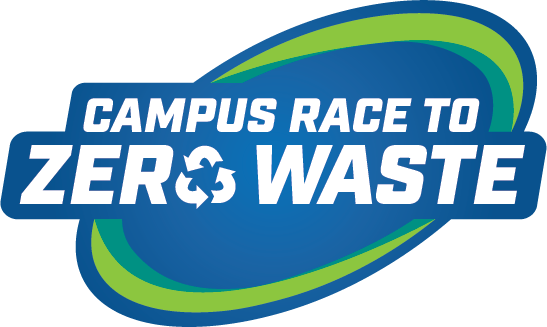The Campus Race to Zero Waste (formerly RecycleMania) welcomes all colleges, universities and secondary institutions of higher learning to participate. Inclusion in certain categories and listing in the formal rankings is dependent on a school’s ability to track and report the required information.
Please review the requirements for each Category as well as weight tracking standards to determine how your school can participate. Reporting for most categories is for institutional trash, recyclables, food organics, and materials for reuse only. The only category that allows the community (beyond the campus borders) to participate is the Electronics category, and the electronics drop-off must be on campus property.
Accepted Materials
The following items are acceptable to report with the respective material type. View individual category descriptions to understand which general material types are included in the specific result calculations.


Paper
- Boxboard / chipboard
- Catalogs
- Hard and softbound books
- Junk mail
- Magazines
- Newspaper
- Office paper
- Phone books
- Shredded paper


Cans and Bottles
- #1 through #7 Rigid plastics (e.g., soda, water, juice, laundry detergent bottles)
- Aluminum cans
- Glass bottles and jars
- Steel cans
- Other food or beverage containers accepted by local recycling program


Food Organics
- Pre and post-consumer food waste
- Compostable dinnerware, napkins, etc.
- Food waste used as animal feed may be included
- Edible food recovered for donation to shelters, etc.
- Used cooking oil


Cardboard
- Baled and unbaled cardboard boxes
- Boxboard / chipboard
Trash
- Municipal Solid Waste (MSW). Any materials disposed through a normal MSW waste stream should be reported as “trash” regardless of whether or not it would otherwise be counted if recycled, reused or composted. Materials processed through waste-to-energy incineration are considered trash and not accepted as recycling.
- Construction and demolition waste and medical waste are not included in RecycleMania as trash or recycling


Electronics
NOTE: Only for Electronics category. Electronics are not included with the traditional 8-week categories (Per Capita Recycling, Diversion etc.) Schools may count specific materials not included on the following list if they are otherwise accepted as “electronics” by their recycling service provider. All materials must be handled by an R2 or e-Stewards certified recycler to be counted in the competition.
- Computers, printers, related equipment
- Hand held devices
- Consumer electronics
- Power cords, chargers and other ancillary equipment
Unacceptable Materials
The following materials are not counted and should not be reported for any Campus Race to Zero Waste category:
- Appliances (accepted for Zero Waste categories only)
- Furniture (accepted for Zero Waste categories only)
- Industrial plastics
- Film plastics
- Pallets
- Yard / landscape waste
- Medical waste
- Hazardous waste
- Large-scale construction or demolition project waste
- Scrap metal, wood or other maintenance-related waste that is recycled. *Small-scale maintenance waste disposed with normal trash sent to a landfill or incinerator would still be counted as trash.
Weight Tracking Standards
The following tracking and reporting standards apply to all Campus Race to Zero Waste categories except for the Electronics category.
> Recycling and trash data are reported as weight in either U.S. pounds or metric kilograms. Where possible, schools should use actual weights measured with a scale. Where this is not possible they can use a volume-to-weight formula to estimate the weight. In this case, we strongly encourage schools to arrange to collect and weigh multiple samples at the outset to develop formula that reflects their actual waste stream. As a last resort if this is not possible, schools can use the conversion formulas published by the US EPA. Note: since each local waste stream is unique, generic conversion formulas can be significantly higher or lower than the actual weight. For this reason, schools are responsible for using their judgement if they believe the US EPA or any other formulas are significantly higher or lower than their waste stream. We encourage you to contact us (CR2ZW@nwf.org) for assistance in this situation.
> Regardless of whether using actual weights or a volume to weight conversion formula, the data should be based on the actual measured quantity of materials collected. In other words, if relying on volume to calculate weights, the school should be tracking how full bins or dumpsters actually are when emptied, and not simply multiply using the capacity of the bin. Ex: if an 8 yard dumpster is roughly half full when emptied, 4 yards should be used to calculate the weight. Exceptions to this rule include:
- Schools that receive weights infrequently (ex: with monthly invoice). In this case, use past weekly averages to report placeholder numbers each week. There will be an opportunity to revise reports with actual data at end of competition.
- Schools that have no way to track data from sections of their campus or auxiliary facilities. In this case, schools may develop a formula to estimate for up to 25% of their total reported weight. Campus Race to Zero Waste staff must approve the methodology in advance (email CR2ZW@nwf.org)
> Stockpiling recyclables for the primary purpose of improving competition results is not permitted. Schools may include stored materials such as paper or electronics that are purged as part of a normal operational process, or that are collected from individual students and staff as part of a promotional collection activity.
> Hospital Facilities – Since non-academic staff are excluded from Campus Race to Zero Waste’s population eligibility (see explanation), schools have two choices for reporting:
- Exclude hospital material weights from their reporting.
- During registration, report the number of non-academic staff in the hospital (can determine by contacting hospital human resources department). If this is done, school can include all hospital material weights.
